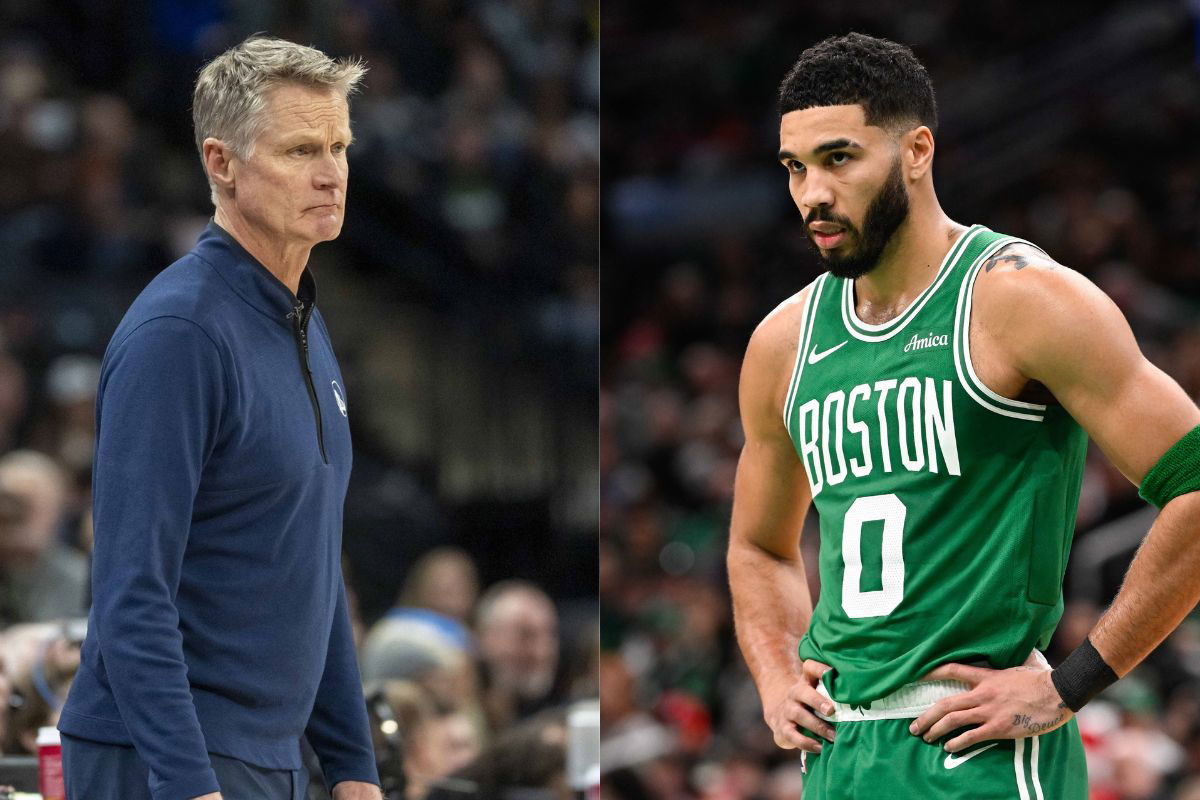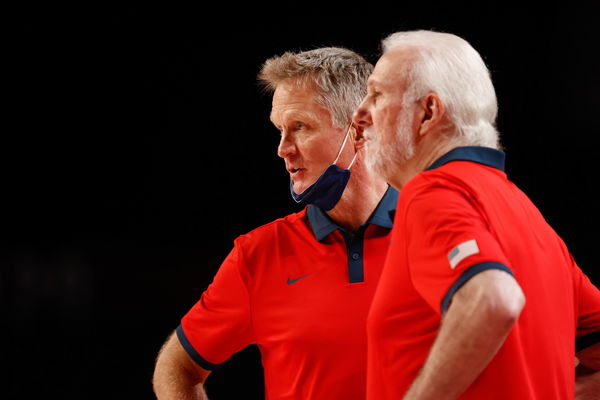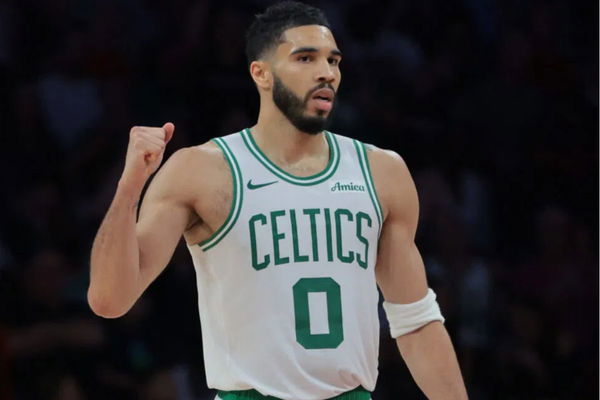
USA Today via Reuters
Image Credits: USA Today Network Via Imagn Images

USA Today via Reuters
Image Credits: USA Today Network Via Imagn Images
The United States men’s team arrived at the Paris Olympics with sky high expectations, and a loaded roster with big NBA names like LeBron James, Steph Curry, KD and Jayson Tatum. A team that read like a who’s who of modern basketball. Preparation in Las Vegas and exhibition games in Abu Dhabi and London were supposed to cure any chemistry worries, yet several tune up tests showed cracks in cohesion when opponents pushed tempo and hit outside shots. The star studded roster, nicknamed “The Avengers,” ultimately accomplished its mission- beating France 98-87 for the gold medal. And the journey wasn’t all smooth sailing even for the likes of Steve Kerr, as revealed in a recent video.
Watch What’s Trending Now!
Behind the celebratory photos and gold medals, there was a palpable sense of tension that followed the team throughout the summer, stemming from the immense pressure to succeed. That underlying anxiety appears to have started at the very top with Head Coach Steve Kerr. Despite having a lineup filled with future Hall of Famers, a recently surfaced video reveals that Kerr was privately far less confident than his public persona suggested. This admission provides a startling glimpse into the true mindset of the man tasked with guiding basketball’s most talented team.
ADVERTISEMENT
The revelation came from an unlikely source: a YouTube video posted by the Aleda Collective featuring a conversation between Kerr and soccer manager Mikel Arteta from ‘The Leadership Playbook’ conference on September 5, 2025. The Spanish manager recounted a moment in Las Vegas during Team USA’s training camp. He recalled asking Kerr how he felt about his squad, expecting a confident reply. Instead, Kerr confessed, as told by Arteta, “What do you mean? I don’t have enough time to prepare the team… I always want more and I’m always on alert mode”.
This private moment of doubt starkly contrasts with the unified confidence the team projected publicly. The response revealed a coach who was constantly on edge and always wanting more preparation, and the clip adds a human layer to Kerr’s public calm. During the conversation, Steve Kerr cut Artata mid-sentence to add- “and we barely won”, giving a peek into the fear of complacency that drove Kerr’s approach.
ADVERTISEMENT

Imago
July 31, 2021, Tokyo, Kanto, Japan: USA Coaches Gregg Popovich and Steve Kerr during their team 119-84 win over the Czech Republic, leading the Americans into theCoaches Steve Curr an quarterfinals of the Olympic men s basketball tournament. in the Tokyo Olympics 2020. Tokyo Japan – ZUMAk13_ 20210731_zap_k13_008 Copyright: xPaulxKurodax
Steve Kerr has publicly leaned into the idea of keeping a healthy respect for every opponent as a core mindset learned from Gregg Popovich. This sense of panic was arguably justified when examining Team USA’s precarious path to the gold medal. The team nearly suffered stunning losses to South Sudan and Germany in exhibition games, winning by just one and four points, respectively. During the semifinal at the Olympics, they found themselves trailing Serbia by 17 points, a massive deficit that required a frantic fourth quarter comeback. Kerr’s “appropriate fear” philosophy, borrowed from Popovich, was clearly a necessary mindset for a team that was far from invincible.
ADVERTISEMENT
Those fears played out in hard choices that followed because Team USA rotated personnel often and sometimes left talent underused. Jayson Tatum’s role became the lightning rod when he logged only 17.7 minutes per Olympic game, numbers that surprised many given his recent NBA championship and All NBA honors.
Kerr described the misery of picking minutes with a blunt line in an episode of the Netflix documentary, Court of Gold, when he said, “I think the hardest part of the job for me is playing time. Even picking the rotations. How do you put seven Hall of Famers on the bench? I’ve told the team, ‘This is hard for us, too. It’s hard for you to not play. It’s hard for us to not play you'”. Those words underline the trade offs Kerr was living with during a compressed camp schedule. But even in ‘The Leadership Playbook’ conference, Kerr visibly failed to address the issue, raising eyebrows across the sports fanbase.
ADVERTISEMENT
A lot of the public heat focused on the optics and the unanswered questions around Tatum. Because the choice to limit his minutes was one of the few decisions that everyone could see and debate. Kerr later tried to frame the move as part of a team-first culture. He also said that Tatum handled the situation like a professional and added that outside commentary amplified a story that was smaller in reality. Still, there remains a sense among fans and some media that not all of the personal fallout has been fully aired. And that tension will follow Kerr into the NBA season as a subplot of his leadership narrative. That lingering thread is the story we examine next.
ADVERTISEMENT
The elephant in the room
That issue is the perplexing treatment of Jayson Tatum. Fresh off leading his team to an NBA championship in 2024, Tatum was expected to be a cornerstone for Team USA. Instead, he received the sixth-most minutes on the roster, was benched entirely for two games- including both matchups against Serbia- and averaged a mere 5.3 points per game. The math of rotations became shorthand for critics who asked why a freshly crowned NBA champion logged the lightest minutes among the top contributors. Moreover, the raw numbers made the coaching choice visible and easy to question.

Imago
Mar 14, 2025; Miami, Florida, USA; Boston Celtics forward Jayson Tatum (0) reacts against the Miami Heat during the third quarter at Kaseya Center. Mandatory Credit: Sam Navarro-Imagn Images
The situation has created visible awkwardness long after the gold medals were handed out. During two separate NBA games between Tatum’s Celtics and Kerr’s Warriors, cameras caught notably cold interactions. Tatum was seen exchanging pleasantries with Warriors star Stephen Curry before quickly turning away from Kerr, leaving the coach lingering awkwardly. This body language suggests that not all is settled, despite public claims to the contrary.
ADVERTISEMENT
Kerr has repeatedly called Jayson Tatum “an absolute dream to coach” and has stated the controversy is “overblown.” However, he has never fully explained the basketball reasoning behind limiting a player of Tatum’s caliber so drastically. This lack of a detailed explanation, combined with the continued awkwardness, leaves the situation unresolved and fuels speculation that the gold medal victory may have come at the cost of some internal harmony.
ADVERTISEMENT
ADVERTISEMENT
ADVERTISEMENT